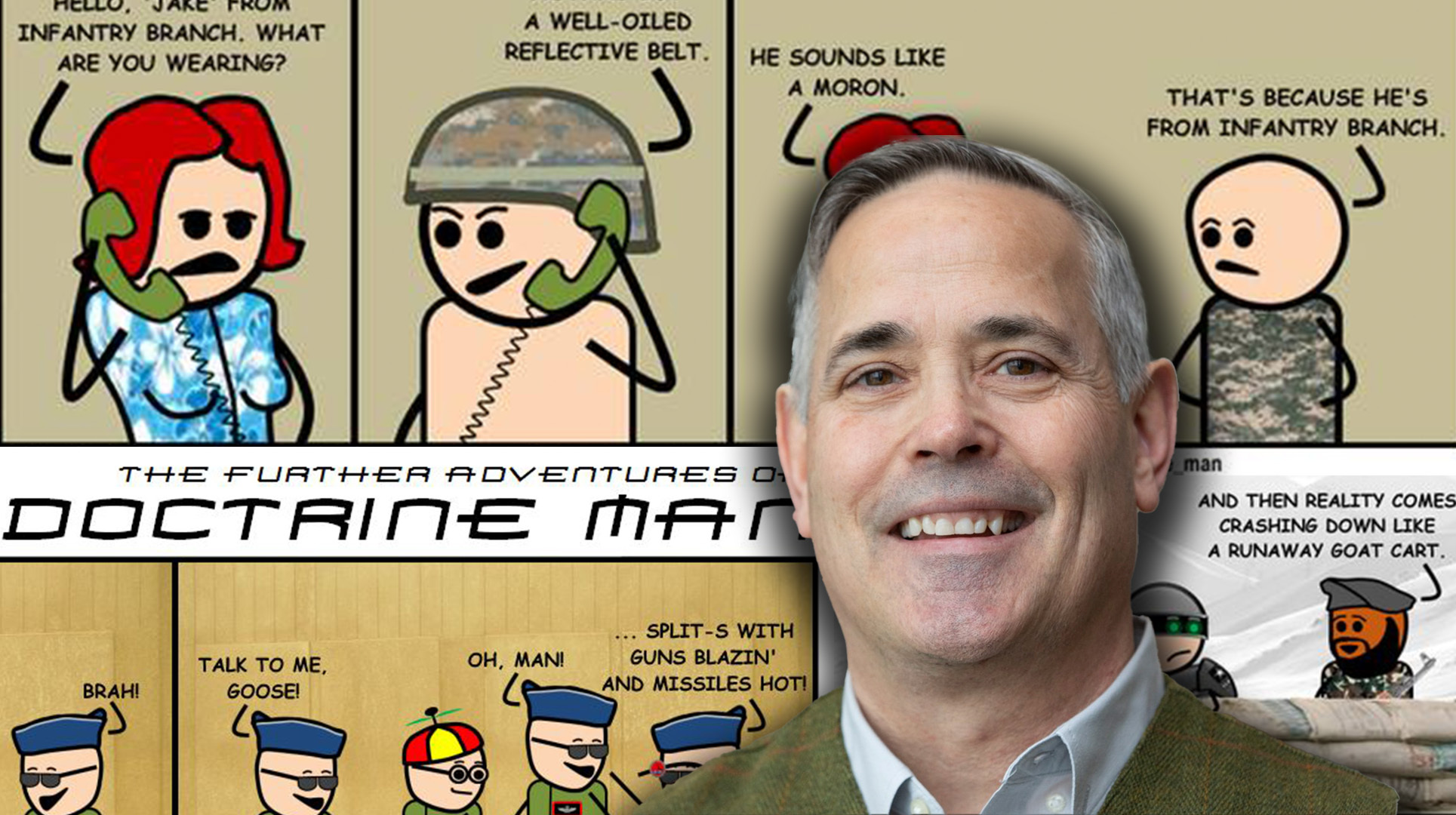

Retired Army Col. Steve Leonard has announced that he is ending his “Doctrine Man” cartoon, which has captured the eccentricities of military life for 16 years.
The cartoon’s last edition will be posted on June 6, the 80th anniversary of the D-Day landings during World War II, Leonard posted on “X.”
“D-Day seemed like the optimal day – I mean D-Day, ‘Doctrine Man,’” Leonard told Task & Purpose on Wednesday. “It’s cliché to a fault, but it seems like the right time to do it. That gives me time to do some prep work to sunset the thing.”
The former Army strategist said he has been mulling over when to retire his cartoon for some time. He has devoted two to three hours a day for the past 16 years to “Doctrine Man,” and now he wants to use that time to do other things.
Featured in the New York Times, “Doctrine Man” has long been a favorite of service members and veterans, combining Bill Maudlin’s innate understanding of military minutiae with “The Office’s” analysis of group dynamics. The cartoon has politely ridiculed the military as an institution and the day-to-day life of troops, said Leonard, who now teaches leadership and business strategy at the University of Kansas.
Leonard certainly has a lot of intuitional knowledge about the military. He spent the first half of his Army career as a logistician. He served in the 1991 Persian Gulf War and later deployed to Iraq several times and then worked as a strategist from 2006 until he retired on Dec. 31, 2014.
Subscribe to Task & Purpose today. Get the latest military news and culture in your inbox daily.
He first started the cartoon working in the U.S. Army Combined Arms Doctrine Directorate at Fort Leavenworth, Kansas.
“It was such an interesting place,” Leonard recalled. “You saw so much – so many unique personalities in that community. So, it became a way to kind of make fun of ourselves – the ludicrousness of the urgency of so much of what we did.”

Even though he had dabbled in drawing, he considers himself a “lousy artist,” which is why he has used stick figures for “Doctrine Man.” The cartoon started out small, with Leonard and his co-workers sharing it within the confines of their cubicles.
Eventually, “Doctrine Man’s” reach and scope expanded, and the cartoon became a staple of the Global War on Terrorism. Most of the time, he didn’t get any pushback from higher ups, but sometimes he had to deal with “misunderstandings” from people in the Army about what the cartoon meant to convey.
“Whichever general I worked for at the time always knew what I was doing,” Leonard said. “And so they were never really caught off guard. The only pushback that I ever got was from people who didn’t really understand what it was that I was trying to do, which was not just make people laugh a little bit at themselves but share key topics and drive discussions that we needed to have as a profession.”
One of the cartoons that Leonard had the most fun drawing shows two U.S soldiers at Fort Drum New York. Even though it takes place in summer, the soldiers are up to their necks in snow.
“FML,” one of the soldiers says, echoing countless of other battle buddies before him. “I hate this place.”
The cartoon not only summarized Army life in a nutshell, but the Pritzker Military Museum & Library in Chicago displayed it as an example of military cartooning.
“It’s nice to know that that cartoon resonated just beyond our audience and touched people in other ways,” Leonard said.
Leonard has been touched by the number of messages he has received since announcing on Wednesday that “Doctrine Man” is nearing the end of its 16-year run.
“It’s an indicator that we scratched the itch in the way we wanted to in terms of being a voice reason in a sea of chaos where you can go get a good laugh; you can read about something important; you can comment on it; you can carry on a conversation,” Leonard said. “That’s how you want to be remembered. And I think that’s how any of us want to be remembered, is that we made a contribution to our profession in a positive way that will be remembered that way.”
The latest on Task & Purpose
- Former Army base warns of grenades on local trails
- ‘Black Hawk Down’ Ranger veteran awarded Silver Star
- The Air Force’s new $60 million Special Warfare center honors a fallen pararescueman
- Former Air National Guardsman may have defected to Russia
- Marine battalion commander fired for “loss of trust and confidence”